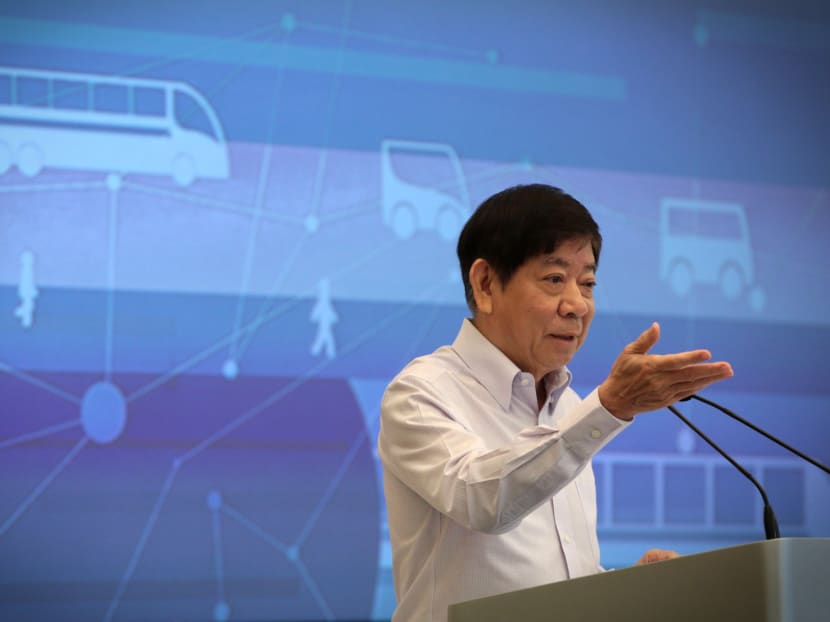LTA to invest S$25 million to study technologies disrupting land transport
SINGAPORE – To keep up with disruptive technologies, the Land Transport Authority (LTA) will invest S$25 million over the next five years to promote research and collaborate with industry partners in areas like autonomous technology and data analytics.

Transport Minister Khaw Boon Wan speaks at the launch of the Land Transport Industry Transformation Map, on Monday (Feb 12) Photo: Jason Quah/TODAY
SINGAPORE – To keep up with disruptive technologies, the Land Transport Authority (LTA) will invest S$25 million over the next five years to promote research and collaborate with industry partners in areas like autonomous technology and data analytics.
This was announced by Transport Minister Khaw Boon Wan on Monday (Feb 12) as he unveiled the industry transformation map (ITM) for the land transport sector, where 8,000 new jobs are expected to be created by 2030 to meet the future needs of Singapore’s rail and bus networks.
“Globally, land transport is being disrupted by new technologies – artificial intelligence, automation, mobile connectivity and big data. Some of these technologies can be unsettling,” said Mr Khaw. “However, we can also ride on them to enhance our land transport system and create even better jobs.”
New technology will also “hasten the move” towards higher value-added transport jobs, he added. Some 123,000 people currently work in the land transport industry, including 21,000 in the rail and public bus sectors.
ITMs, first announced in Budget 2016, aim to integrate the restructuring efforts for 23 industries under six clusters. The transformation maps for the aviation and maritime industries had been announced earlier.
“Our land transport ITM seeks to transform the industry to ensure it stays relevant in supporting Singapore’s future growth and meeting commuters’ needs,” said Mr Khaw, who dwelt extensively on the need for workers and planners alike to address the disruptions brought on by new technologies.
LTA’s S$25 million innovation fund, for instance, will foster collaborative projects between the authority and industry partners such as ST Kinetics. Current projects underway include augmented reality devices for railway training, maintenance and inspection as well as autonomous robot movers for train depots.
Another key element of the ITM is skills upgrading for workers. A clearer pathway for training and development in this area will be charted under Public Transport Skills Framework to be launched in May, said Mr Khaw.
Institutes of higher learning, as well as the Singapore Bus Academy and the Singapore Rail Academy, will also be involved in helping workers stay updated with industry developments. To date, over 2,200 workers have benefited from courses organised by the two academies, Mr Khaw added.
Separately, transport operator SMRT disclosed that it will account for about a third (between 2,500 to 3,000) of the 8,000 new jobs expected to be created in the public bus and rail sectors by 2030.
The Thomson-East Coast Line, which is expected to be ready by 2024, will account for about 1,700 of those jobs, according to SMRT’s chief corporate officer Gerard Koh.
Mr Koh said the majority of these newly created jobs will come from three key areas – big data analytics, cyber security as well as predictive maintenance - and the company expects to hire both fresh graduates as well as those looking to make mid-career switches.
“Why is the (transport industry) a sunrise industry? It’s growing in numbers, you won’t lose your job,” he added.
Mr Tan Lai Chua, a bus technician supervisor with SBS Transit, expressed hopes that the newly launched ITM would provide transport workers with more training opportunities to adapt to the changing industry.
Technicians currently working on diesel-powered buses, for instance, would have to learn how to handle hybrid and electric buses, which could potentially be rolled out on roads here.
“We have to keep up with new technology and work processes. If we don’t, we’ll be left behind,” said Mr Tan, 40.






